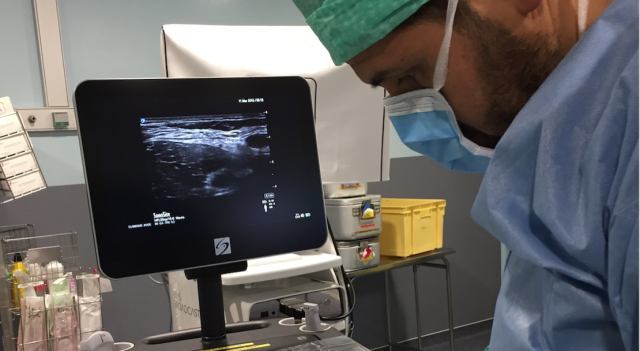
The Clinique Juge is a Marseille clinic specialising in ambulatory surgery. Combining regional anaesthesia with focused pre- and post-operative care, the clinic aims to allow patients to return home soon after orthopaedic surgery, often on the same day as their procedure. Anaesthetist Dr Philippe Grillo explains the benefits of this approach, and the role of point-of-care ultrasound in ensuring effective nerve blocks and post-operative pain relief.
"We treat around 15,000 patients a year, and have been using regional anaesthesia for approximately eight years to accelerate post-operative recovery. We now perform around 70 to 75 per cent of cases as ambulatory surgery, aiming to discharge patients the same day as their procedure where possible. Obviously not all patients are suitable for this approach; it depends on their medical status and any potential complications with their surgery or aftercare. We carry out an extensive pre-operative assessment with each patient, involving the anaesthetist, surgeon and physiotherapist in this process to help us anticipate any possible issues and plan the most effective recovery and rehabilitation. This not only gives us a clear idea of each patient’s likely needs, it also allows them to plan ahead, for example when they are likely to need transport home, and how long it is likely to be before they are mobile again or can resume normal daily activities.
Pain management is an important aspect of any patient’s care, during both surgery and recovery. Regional nerve blocks can provide effective anaesthesia in many cases – such as hand, foot, ankle, knee and shoulder surgery – allowing patients to remain awake during the procedure and avoiding many of the potential complications associated with the use of general anaesthesia and opioids. This shortens the post-operative recovery time, allowing patients to go home sooner. Point-of-care ultrasound needle guidance has become standard practice for performing these blocks, allowing us to accurately place the needle for injection regardless of variations in individual anatomy. This is particularly useful for, for example, interscalene blocks in shoulder surgery. There are a lot of closely packed nerves in this region, and so it is important to carefully identify the injection site. Our Sonosite M-Turbo® and X-Porte® systems are ideal, making it easy to visualise the needle, the nerve of interest and any neighbouring structures. The improved accuracy offered by the clear images they provide also means that we can use less anaesthetic to achieve an effective block.
Another key consideration for early discharge of patients following surgery is ensuring they remain comfortable. Although regional anaesthesia provides some medium-term pain relief – a single injection block will be effective for up to 10 hours – this may not be sufficient in many cases, particularly after complex surgery. To overcome this, we send those patients home with a catheter, which continues to deliver localised pain relief to the affected area for up to three days. Using ultrasound to guide catheter placement is essential in these cases; if we know exactly where the catheter is placed, we can be confident that it will be effective and we won’t have any complications. Without this assurance, we simply wouldn’t be able to send these patients home.
We have been using this approach for several years, and it has proved very effective. It is particularly useful for painful procedures, such as shoulder and knee surgery. We have even recently begun performing complete knee replacements as ambulatory cases. This success has led to anaesthetists from across France visiting us to learn the technique, and our X-Porte is an ideal teaching tool. A large screen and excellent resolution, combined with its very good ergonomics and ease of use, make it easy to clearly see the end of the catheter; everyone is very complimentary about it."
Learn About the Sonosite X-PORTE
Dr Philippe Grillo uses the Sonosite X-Porte. Learn about the X-Porte's new imaging technolgy that reduces artifact clutter whilte enhancing contrast resolution.

